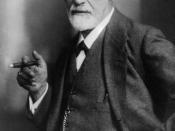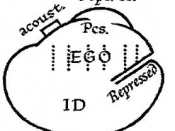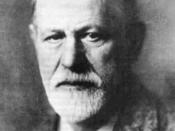Describe and Critically Evaluate the Psychoanalytical Approach
Plan:
1.Introduction
2.Methods and Discoveries
3.Model of Personality
4.Stages
5.Therapies
6.Criticisms, Evaluations and Research
7.Conclusion
The psychoanalytical approach is a controversial doctrine based on the system of psychoanalysis developed by Sigmund Freud. Freud was primarily interested in investigating the unconscious mind through the study of dreams, mental illness and everyday slips of the tongue or actions. He conducted a series of in-depth studies of adult neurotic, which enabled him to devise his theory of human personality, a theory of psychosexual development and an explanation of the causes and treatment of neuroses.
Freud was interested in neurotic mental illness and developed his own technique: free association, which became one of the fundamental tools of psychoanalysis. Freud's patients had to describe whatever came to mind- no matter how silly. They often revealed memories that had disturbed them in childhood a great deal and resulted in their neurotic behaviour.
Quite often, the patients had difficulty recalling this childhood event. Freud, by use of free association would encourage them to remember the event from there past and so the patient could come to terms with it and hence recover from his neuroses. Another method was the interpretation of dreams in which Freud outlined his theory of the mind. A further discovery was transference, where the patient projects his feelings on to the therapist.
Freud found that personality consisted of three structures; the Id, the Ego and the Super Ego .The Id is the unconscious mind - it follows the pleasure principle and it contains inherited instincts and primitive drives. The Ego or reality principle is developed from the Id and acts as a mediator between the instinctive demands of the Id and the outside world. The Ego stands for...



Where did you get your information?
I'm a psychology major at NYU in New York, and I'm sorry to say but you have your stages all wrong. Oral Stage is 0-18 months old, Anal is 18 months to 3 years, Phallic is 3-6 years old and Genital is puberty. The Latency period is from age 6 to puberty.
0 out of 0 people found this comment useful.